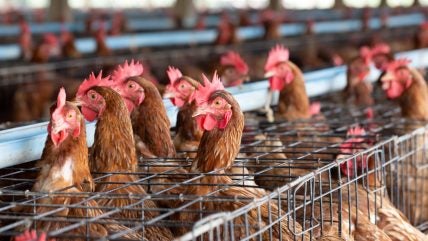
Brazil has curbed its exports of poultry meat and eggs to 44 countries following the discovery of the Newcastle viral disease on a farm in Rio Grande do Sul state.
The suspension, confirmed by the Ministry of Agriculture and Livestock (Mapa) late on Friday (19 July), covers all of Brazil for poultry meat and egg exports to China, Argentina and Mexico. Restrictions to other countries have been put in place on a regional basis based on proximity to the affected farm.

Discover B2B Marketing That Performs
Combine business intelligence and editorial excellence to reach engaged professionals across 36 leading media platforms.
Newcastle disease, which according to the ministry affects domestic and wild birds, was detected on a poultry farm last Wednesday in the municipality of Anta Gorda. Earlier on Friday, Brazil declared a so-called ‘state of zoosanitary emergency’ in the state of Rio Grande do Sul state for 90 days following the detection of the pathogenic virus.
The last confirmed cases in Brazil were in 2006, discovered in “subsistence birds” in the states of Amazonas, Mato Grosso and Rio Grande do Sul, Mapa said.
“Following the international rules for trade in poultry and poultry products, the suspension of temporary certification is conducted by Brazil in order to guarantee the transparency of the Brazilian official service, vis-à-vis the countries importing the products,” Mapa said in a statement.
“The suspensions are related to the area or region with certification impediments, which range from suspension for at least 21 days for the entire national territory or even a restriction limited to a radius of 50km from the identified focus.”

US Tariffs are shifting - will you react or anticipate?
Don’t let policy changes catch you off guard. Stay proactive with real-time data and expert analysis.
By GlobalDataFor China, Argentina and Mexico, Brazil’s export suspension applies to fresh poultry meat, eggs, meat for animal feed, “raw poultry material for opterapic purposes, meat preparations and untreated blood products”.
Export restrictions from Rio Grande do Sul itself apply to the EU, the UK, South Africa and Saudi Arabia. At least 25 other countries, from Hong Kong to Paraguay and Ukraine, are also included in the Rio Grande do Sul export suspension.
Affected products are “fresh, chilled or frozen poultry meat; eggs and egg products; meat, meat products and poultry offal; poultry, swine and ruminant meal; heads and feet; poultry fats; cooked, cured and salted sausages; processed and thermo-processed meat products; and raw materials and products for animal feed”.
Within a radius of 50km from the Anta Gorda farm outbreak, restrictions have been put in place for exports to Canada, South Korea, Israel, Japan, Morocco, Mauritius, Namibia, Pakistan, Tajikistan and East Timor.
The curbs apply to “poultry meat; poultry meal, feathers and fish for use in animal feed; and cooked, thermally processed, inedible meat products derived from poultry”. They do not apply to products with a production date up to 8 July.
Mapa added: “It is worth noting that products subjected to heat treatment such as thermo-processed, cooked and processed products destined for Argentina, South Africa, Chile, the European Union and Uruguay do not have any limitations and may normally be certified.
“Furthermore, the Ministry of Agriculture emphasises that the suspension rules are reviewed daily, taking into account the ongoing negotiations with partner countries, in which all the actions that are being carried out to eradicate the outbreak are presented.”
Just Food has approached the major meat processors in Brazil – JBS, BRF and Marfrig Global Foods – for comment on any potential impact from the poultry export restrictions.
BRF confirmed the company operates five plants in Rio Grande do Sul but can reallocate production volume to its total of 38 facilities in Brazil.
The meat group said it “added more than 25 new export permits during the first half of 2024 and another 66 during 2023, which will contribute to greater flexibility in volume allocation”.
Mapa said Rio Grande do Sul is the third-largest exporter of chicken in Brazil, behind the states of Paraná and Santa Catarina.
In the first six months of this year, the state shipped 354,000 tonnes of affected poultry products valued at $630m, compared to $4.6bn for Brazil as a whole, the ministry said.
The key destinations in that period for exports from Rio Grande do Sul were the UAE, Saudi Arabia, China and Japan.
Agriculure minister Carlos Fávaro stressed last week that the Newcastle disease outbreak and not been assessed as an “epidemic” because the detection was limited to a single bird among a flock of 14,000.
“Isolation has already been carried out, and to date, we have no trace of other sick animals on this farm or in the region,” he said.
Meanwhile, Mapa said it had put a contingency plan in place. “Among the actions foreseen in the contingency plan are actions to sacrifice or slaughter all birds where the outbreak was confirmed, cleaning and disinfection of the site, adoption of biosecurity measures, demarcation of protection and surveillance zones on all properties within a 10km radius, definition of sanitary barriers, among others,” the ministry said.



